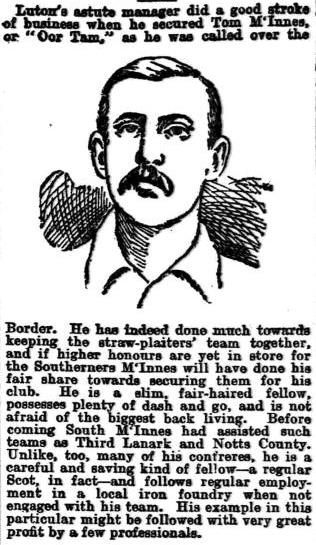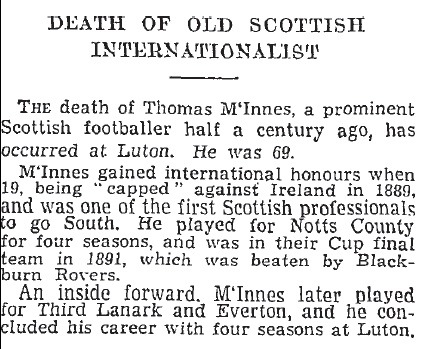The record books show that Thomas McInnes was capped by Scotland in 1889 while with Cowlairs, and that he was prominent on both sides of the border through the 1890s. Trouble is, there was another Thomas McInnes playing at the same time, who was equally prominent, Scottish and a forward, and for a while they both played in the same city, Nottingham. The result is confusion, and many record books get them mixed up. It took hours of trawling through newspaper reports to sort them out, but I am confident that I have the definitive stories. (With thanks to Paul Joannou for his input.)
Thomas McInnes, the internationalist
Born Glasgow 22 March 1869 (not 1870 as widely stated); died Luton 17 January 1939.
Started his career with Cowlairs in the late 1880s, and was capped for Scotland v Ireland on 9 March 1889, scoring the final goal in a 7-0 victory. Went to Notts County in December 1889 and despite being Scottish was selected for the Football League in their first match against the Scottish League on 11 April 1892. The following month he returned to Scotland and joined Rangers, playing in a few end-of-season Charity Cup ties and the opening four league matches of the new season.
In September 1892 he was welcomed back at Notts County but first had to serve a month's FA suspension for having playing in Scotland (those were the rules at the time!). In summer 1893 he went north again for a season with Third Lanark, and then joined Everton for three seasons until 1897. He was at Luton Town from 1897-99, and wound up his career at Bristol Rovers and Bedford Queen's Engineers before retiring in 1901.
Outside of football, McInnes worked in an iron foundry in Luton, and remained in the town until his death aged 69. He married Sophia Irvine and had two sons.
The cuttings below show a drawing of McInnes in 1899 (Dundee Courier) and an obituary (The Scotsman).
Born Bowling, Dunbartonshire, 8 July 1873; died Dalmuir, Dunbartonshire, 1 December 1937.
Full name: Thomas Fair Macaulay McInnes.
McInnes went to Newcastle as a 16-year-old, primarily to find work as a rivetter. It was only once he got there that he signed up for Newcastle East End in December 1889, and played for them until the summer of 1891, also making occasional appearances for Newcastle West End. He spent the 1891-92 season in Glasgow with Clyde, then moved to Nottingham Forest in the summer of 1892. In his first season he was at City Ground while his namesake was playing across the river at the County Ground.
He had eight fruitful years with Forest, winning the FA Cup in 1898, and nearly won a Scotland cap as he was twice selected for the Anglo-Scots in the international trials of 1897 and 1898. Then in 1900 he moved to Lincoln City, where he had three seasons. That should have been the end of his playing career, but he had a brief swansong on returning to Scotland, signing for Port Glasgow Athletic in January 1905, and scored on his debut in a Scottish Cup tie against Stranraer. He made just one league appearance the following month.
McInnes married Ethel Pearson in Lincoln in 1903 and they had four children.


 RSS Feed
RSS Feed